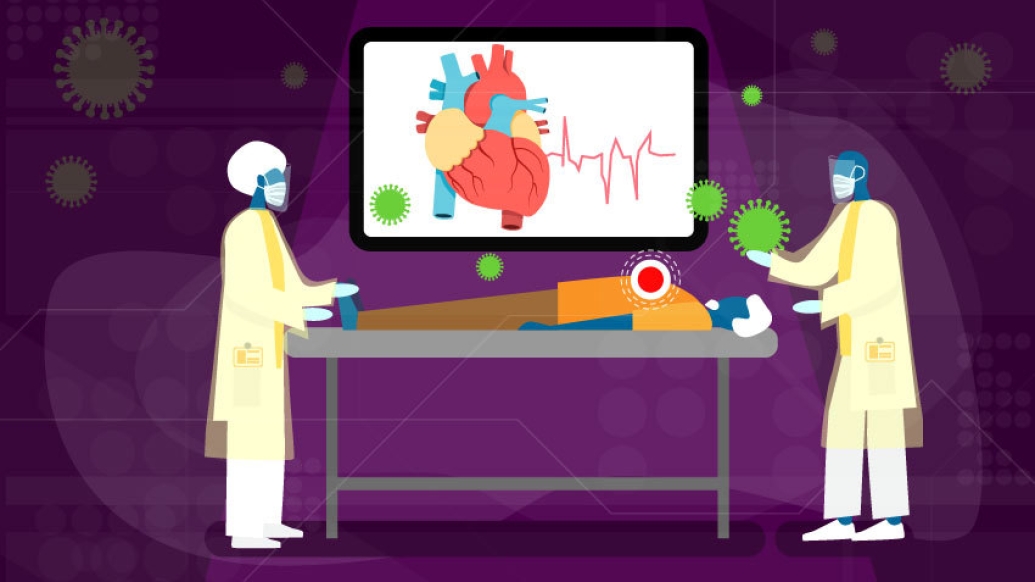Study shows critically ill patients with the novel coronavirus have high rates of cardiac arrest and poor outcomes even after CPR, an effect most strongly seen in older patients.
8:46 AM
Author |

Even when a sudden cardiac arrest happens inside a top hospital, where a code blue team is readily available, most people won't survive.
This year, while researchers continued exploring how to improve dismal cardiac arrest survival rates, clinicians started noticing a new population of patients who seemed to be experiencing this heart event quite often: those hospitalized for COVID-19 infection.
This sparked an observational study led by experts at the Michigan Medicine Frankel Cardiovascular Center and Brigham and Women's Hospital that leveraged data from 68 hospitals across the United States, just published in The BMJ.
Researchers reviewed data from more than 5,000 U.S. patients, including those at Michigan Medicine, who were hospitalized in the intensive care unit for COVID-19. Fourteen percent of them experienced cardiac arrest within two weeks of being admitted to the ICU.
"Cardiac arrest is common in older patients with COVID-19, and survival rates after an arrest are poor," says lead study author Salim Hayek, M.D., an assistant professor of internal medicine at Michigan Medicine and a cardiologist at the Frankel CVC. "This is the first multicenter study to investigate in-hospital cardiac arrest in people with COVID-19 infection."
MORE FROM THE LAB: Subscribe to our weekly newsletter
Along with older patients, those more likely to experience cardiac arrest included Black patients as well as those admitted to hospitals with fewer ICU beds.
"One of the more interesting findings was that patients who were admitted to smaller hospitals were more likely to experience cardiac arrest," says co-senior author David Leaf, M.D., MMSc, an assistant professor of medicine at Harvard Medical School. "Further, admission to a smaller hospital was independently associated with an increased risk of death among those who received CPR."
SEE ALSO: Seeking Medical Care During COVID-19
The researchers encourage medical centers to consider how they'll manage high rates of cardiac arrest in their sickest patients with COVID-19, especially if future patient surges occur.
"In general, only around one-fifth of people survive in-hospital cardiac arrest," says co-senior author Brahmajee Nallamothu, M.D., M.P.H., a professor of internal medicine at Michigan Medicine and an interventional cardiologist at the Frankel CVC, who has extensively studied in-hospital arrest procedures and outcomes.
"The numbers for patients with COVID-19 look worse; however, younger patients who receive CPR have reasonable survival rates compared with other critically-ill patients, though less than 3% of people older than 80 who received CPR lived long enough to go home from the hospital."
CPR for patients with COVID-19
Some have questioned whether patients with COVID-19 should be given CPR. In addition to concerns about the effectiveness, there's also worry about the chances of health care providers becoming infected and being taken out of circulation because COVID-19 can spread during resuscitation. Hospitals have strict protocols in place that require providers be suited up in personal protective equipment before getting close to patients with a confirmed or suspected COVID-19 infection, but there is still a risk.
Despite these concerns, Hayek and colleagues found that all patients who did not have a do-not-resuscitate order received CPR. About a third of patients older than 80 received CPR, while more than three-quarters of those younger than age 45 did.
However, only 12% of those patients given CPR survived.
"These data should encourage people to have more discussions about end-of-life wishes, including decisions about resuscitation, ideally before anyone even becomes severely sick," Hayek says.
That's because in COVID-19, unexpected complications can arise quickly.
These data should encourage people to have more discussions about end-of-life wishes, including decisions about resuscitation, ideally before anyone even becomes severely sick.Salim Hayek, M.D.
Leaf adds that the acute severity of illness may have played a larger role in the cardiac arrest rates than existing heart disease, which wasn't independently associated with arrest rates, such as in the case of one previously healthy COVID-19 patient without a cardiac history who experienced cardiac arrest four times.
Other common complications of COVID-19 include blood clots and acute kidney injury.
SEE ALSO: Building a Better 'Code Blue': Study Offers Clues to Survival
And going home from the hospital after surviving cardiac arrest and COVID-19 isn't the end of the health struggles; it's simply an initial victory.
Researchers say, in the small sample size of patients with COVID-19 who were able to leave the hospital after receiving CPR, nearly half of them (20 out of 48 people) went home with a moderate to severe neurological impairment.
This is the latest project to come from the Study of the Treatment and Outcomes in Critically Ill Patients with COVID-19 (STOP-COVID) group led by Harvard's Leaf, which includes detailed data on patients with COVID-19 infection who were admitted to ICUs at one of 68 hospitals across the country between March and June.
SEE ALSO: Keeping Our Patients Safe During COVID-19
"It's impressive that this group led by David and Salim got together under stressful times to put together such a wonderful resource for asking these real world questions," Nallamothu says. "It has provided those of us studying resuscitation in other contexts with invaluable information."
Along with individual researchers' support from the National Institutes of Health, the Frankel CVC funded this project in its pivot to address the pandemic with the COVID-19 Impact Researcher Ignitor Fund.
Paper cited: "In-Hospital Cardiac Arrest in Critically Ill Patients with Covid-19," The BMJ. DOI: 10.1136/bmj.m3513

Explore a variety of healthcare news & stories by visiting the Health Lab home page for more articles.

Department of Communication at Michigan Medicine
Want top health & research news weekly? Sign up for Health Lab’s newsletters today!





